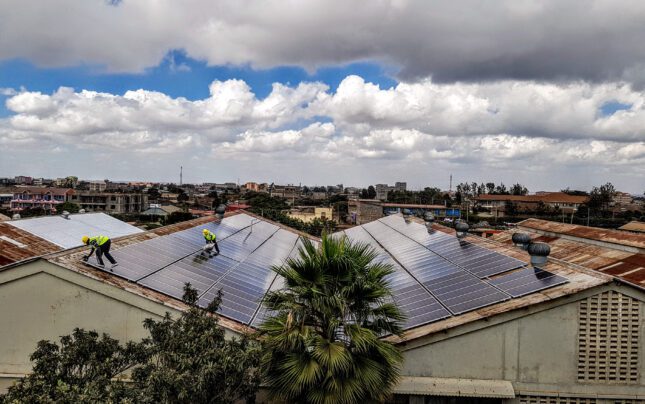-
US-Africa Energy Development: An Opportunity for the Trump Administration?

While traditional fuels likely will remain part of Africa’s energy portfolio for some time to come, the fossil fuel industry does face strong headwinds from a continuing global march towards alternative sources of clean energy. Indeed, the energy poverty experienced by nearly a billion Africans seems incomprehensible given the combination of massive untapped oil and gas resources, as well as available hydropower, solar and wind potential across the continent.
But change could be on the horizon if the incoming Trump administration is convinced there is a need to recalibrate the Africa-US energy relationship, Indeed, energy might be the frontier for US reengagement with Africa, which has seen both resurgent Chinese largesse including loan waivers and inroads by the Russians related to their military-driven role in the Sahel region.
Africa needs huge investments to develop all its natural energy resources, and the race is on for who will fill this investment gap. There is a clear geopolitical message: The nations that step in can win the hearts and minds of African citizenry and elites alike.
The Africa Energy Week held in Cape Town and the Central African Business Energy Forum (CABEF) held in Libreville this past autumn offered possible pathways for such engagement by the incoming Trump administration. As platforms for global investors and Africa’s public and private sectors to engage in substantive dialogue about Africa’s energy future, they provided a stage for new thinking on collaboration.
African Energy Sovereignty as a Pillar
For African nations, energy sovereignty is not merely a development issue. It is also a cornerstone of political and economic independence.
This is something that US leaders—who view energy security as integral to national security—can readily understand. African leaders also argue for the continent’s right to chart its energy future without external interference. Heineken Lokpobiri, Nigeria’s Minister of State for Petroleum Resources, succinctly captured this sentiment when he spoke during African Energy Week: “It is all geopolitics. What is here in Africa to decarbonize?”
Africa’s abundant natural resources (including oil, gas, and minerals) remain massively underutilized, despite the fact that the continent accounts for just 3.2% of global CO2 emissions. Yet Africa bears a disproportionate burden stemming climate impacts.
A recalibrated US-Africa energy strategy could address this obvious contradiction by investing in Africa’s capacity to harness its energy resources, while respecting the continent’s development priorities. Support for Africa’s quest for energy sovereignty also offers the United States a unique opportunity to counterbalance the growing geopolitical influence of China and Russia.
Championing African energy independence also will allow the US to help reduce energy poverty for nearly 600 million Africans who lack access to electricity. A strategy focused on strengthening Africa’s ability to monetize its natural gas resources domestically—where consumption remains at a mere 4.2% —might deliver critical development dividends. Such an approach would position the United States as an indispensable partner in Africa’s long-term energy landscape.
A Just Transition to Balance Goals with Realities
Any recalibration in energy engagement in Africa also should prioritize the advancement of a “just energy transition” increasingly echoed by African leaders. As the global push for rapid decarbonization gains momentum, Africa’s unique energy realities demand a more nuanced approach.
The continent contributes minimally to global emissions, yet Africa faces significant energy poverty, underinvestment, and inadequate infrastructure. As NJ Ayuk, Chairman of the African Energy Chamber, observed, “We are not against the transition, but the transition should not be at the expense of the interest of Africa to determine its own energy future.”
Thus, African nations argue for an all-inclusive energy strategy that will allow them to develop traditional fuels alongside renewables and nuclear energy. Such a balanced approach would not only provide the continent with much-needed energy security but also create jobs, particularly for its growing youth population. Asked about such a transition, Nathalie Lum, the president of CABEF, observed: “Through gas, we will promote industrialization, develop fertilizers, and harness our mining resources. For us, natural gas is the key to the development of Central Africa.”
US alignment with this strategy would mean support for both fossil fuel exploration and investments in renewable technologies For instance, it might play a pivotal role in scaling Africa’s natural gas infrastructure as a bridge to a cleaner energy future. Revenues generated from natural gas exports and increased domestic utilization could fund climate adaptation projects while bolstering economic growth.
Supporting such a multifaceted approach would send a clear message: the United States values African leadership in determining its energy path as it addresses shared global climate challenges.
Low-Carbon Energy: Unlocking Africa’s Economic Potential
Several African nations hold vast, untapped reserves of lithium, cobalt, and rare earth minerals that present an unparalleled opportunity for the continent to position itself as a leader in the global energy transition. Coupled with significant solar, wind, and hydropower potential, these resources make Africa uniquely suited to contribute to a global low-carbon future.
Partnering with Africa on low-carbon energy development is both a strategic imperative and an economic opportunity for the United States. A recalibrated US-Africa energy relationship should emphasize collaboration on renewable energy technologies and supply chains for critical minerals. American companies armed with cutting-edge technologies could provide the expertise and capital necessary to accelerate Africa’s adoption of green hydrogen, solar power, and wind energy. (Indeed, African Energy Week highlighted this shift as a record number of renewable energy companies participated in exhibitions and panels.)
For Africa, transitioning to low-carbon energy is not merely about meeting global climate targets. It also will drive economic growth, job creation, and energy independence. The US should seize this moment to support Africa’s renewable energy ambitions, while ensuring that partnerships are equitable, transparent, and mutually beneficial. This would enable Africa to move beyond reliance on fossil fuel exports while fostering stronger trade and investment ties with the United States.
Investing in African Energies to Shape a New Paradigm
At the heart of Africa’s energy strategy is a call for investment, not aid. As the theme of African Energy Week put it: “Invest in African Energies: Energy growth through an Enabling Environment.”
Such public sentiments underscore a growing recognition among African leaders that true development hinges on fostering partnerships that prioritize mutual benefit over dependency. And the United States is uniquely positioned to answer this call by stepping in as a reliable investor in both traditional and renewable energy sectors.
Funding remains one of Africa’s most significant energy challenges, particularly as Western institutions increasingly divest from fossil fuels. The African Petroleum Producers Organization has responded by establishing the Africa Energy Bank (AEB) to ensure continued access to capital for oil and gas projects.
Nations such as China and Saudi Arabia have ramped up their investments, seeking to fill the funding void. Increased engagement in Africa’s energy financing by US institutions and corporations could simultaneously reassert American geopolitical influence and foster economic stability on the continent.
African leaders remain wary of financial aid schemes tied to stringent conditions, however, including those historically imposed by Bretton Woods institutions. To build trust, the United States must approach African energy development as a partnership. Framing its investments as opportunities for shared growth—rather than charity—will allow the US to help Africa unlock its energy potential as it advances its own strategic interests.
Strategic Path Forward: A US-Africa Energy Alliance
Any recalibration of energy diplomacy by the incoming Trump administration must prioritize actionable, impactful initiatives that align with Africa’s energy needs.
Support for Africa’s energy sovereignty via infrastructure investments that enable the monetization of domestic resources is essential. The United States also must embrace a just energy transition framework that balances fossil fuel development with renewable energy growth. And a robust commitment to Africa’s low-carbon future—through partnerships in technology, critical mineral supply chains, and green energy projects—would solidify the United States as a leader in Africa’s energy transformation.
Adopting a strategic, partnership-driven approach will allow the US to foster a long-term alliance with Africa that begins (and not ends) with energy development. Doing so will cement the role of the US as a trusted ally—and ensure American leadership on a continent that is rapidly becoming a focal point of global competition.
Kalim U. Shah is associate professor of Energy and Environmental Policy at the University of Delaware, and director of the University’s Green Economy Lab.
Etchu Tabenyang is chief executive officer at Ashore Energy. He is also a research fellow at the Green Economy Lab, University of Delaware.
Sources: Afreximbank; Africa Science News; African Energy Week; Atlantic Council; APPO; Brookings Institution; CABEF; Carnegie Endowment for International Peace; CSIS; East-West Center; IEA; World Economic Forum
Photo credit: Roof mounted solar power plant on a factory roof in Kenya, courtesy of Sebastian Noethlichs/Shutterstock.com.
 A Publication of the Stimson Center.
A Publication of the Stimson Center.






